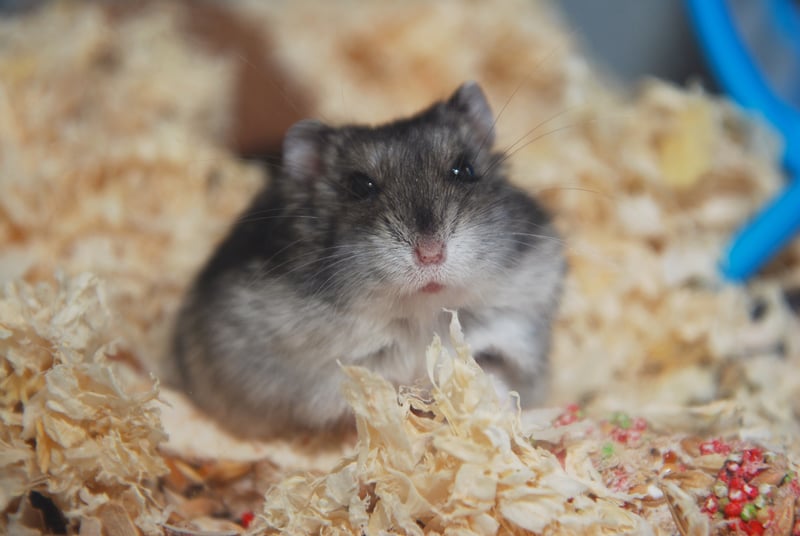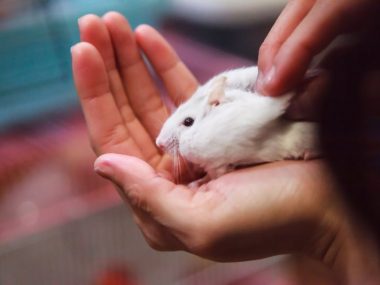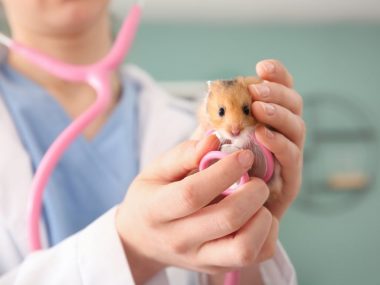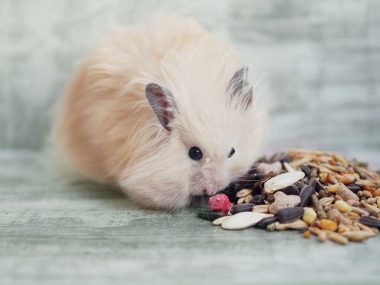Runny poop. It is not a topic that any of us like to think about, and it’s definitely not a comfortable condition for humans or hamsters. However, for our tiny pets, a bout of diarrhea can be much more severe than just being uncomfortable. Prompt action is always required to prevent a deterioration in the condition.
Diarrhea is a common and serious condition that can affect hamsters of any age. Prompt medical treatment is essential to treat the cause of the diarrhea as well as possible associated dehydration, which often develops quickly. Chronic diarrhea in hamsters is called wet-tail.
Staying turned into what your pet’s poop looks like may seem a little odd, but it’s one of the best ways to continuously monitor its health. Let’s find out what’s healthy and what’s not and how to help your little fluff ball when it has diarrhea.
Table of Contents
How To Tell If Your Hamster Has Diarrhea
It is essential to respond immediately at the first signs that your hamster’s poop may be softer than usual. The causes could be simple like your pet enjoyed its fruit platter a little too much, or it could be a serious indicator of a gastrointestinal condition.
To know if your hamster’s poop is softer than usual and if there is any cause for concern, let’s start by understanding what healthy hamster poop should look like.
What Does Normal Hamster Poop Look Like?
Healthy hamster poop is usually firm, oval-shaped pellets. They are dark brown or blackish and are quite dry. There is not usually any bad smell associated with healthy hamster feces, and it usually just dries out, making it easy to tip out of the cage each time you clean.
There may be some slight variation in texture between your hamster’s daytime and nighttime poop. The nighttime variety is often a little softer, but you usually don’t see a lot of those because hamsters often consume those droppings – don’t worry, that is quite normal…if you’re a hamster!
When Should I Be Worried About My Hamster’s Poop?
If your hamster develops watery, runny, smelly, or paler-colored poop, it may be a sign of trouble. Slight tummy upsets resulting from a dietary change are usually short-lived and not particularly worrisome. However, chronic diarrhea can lead to a condition called wet tail which is life-threatening if not treated correctly.
The first signs that your hamster may be developing diarrhea may be finding poop on your hands when handling your pet or on the fur around its bottom. You may even notice bits of the bedding sticking onto your hammie. If you think this is a bit gross, it is even more distressing for your little pet as they are meticulous groomers and don’t like having any damp or smelly sections.
In addition to just becoming more aware of poop around your hamster, dehydration is one of the most troublesome symptoms of diarrhea. The animal may feel ill and not take in enough fluids to replace the amount being lost.
Besides actually noticing streaks of mucky, runny poop on your hamster’s bottom, some other common symptoms may be associated with the development of diarrhea in hamsters. These can be evident long before the tell-tail advanced stages of chronic diarrhea.
- In the early stages, your hamster may appear thirsty and drink more than usual.
- A hamster may lose weight – however, this is often difficult to spot early on.
- The hamster’s posture may change – it may sit in a hunched position.
- It may be less active than usual.
- Hamsters may start showing signs of dehydration, e.g., ruffled fur or loose skin that doesn’t immediately return to its normal position if you pinch its scruff.
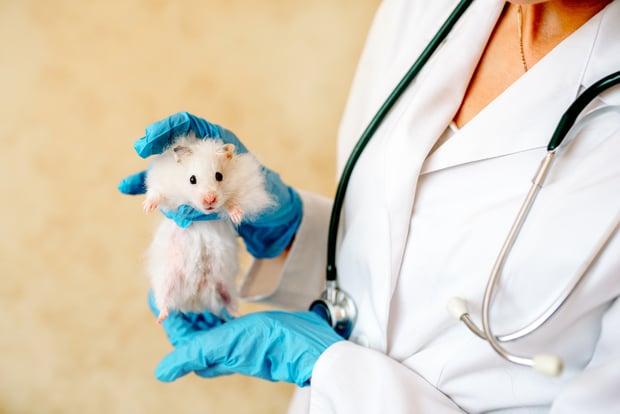
What Causes Diarrhea In Hamsters?
Diarrhea is a common hamster digestive system problem that can rapidly deteriorate and be fatal. Hamster owners are often confused about the cause when their pet suddenly develops runny poop.
Sudden Change of diet or incorrect feeding
When acquiring a new pet hamster, it is a good idea to check what food they were being fed and wean them off it slowly while gradually introducing your preferred brand of pelleted hamster food. Balanced pellets should be the basis of your hamster’s diet.
If you are not sure what to feed your hamster, check out this article which has all the information you need to provide your hammie with a healthy diet. Avoid feeding seed-mix type food as a staple. This allows them to select all the seeds they enjoy and avoid others altogether. Like humans at a buffet, they are likely to pick out all their favorites quickly and may miss out on the essentials.
We all love our hamsters and love giving them little treats. Too much of a delicious thing can cause an upset stomach, so while a few extra snacks can be okay occasionally, try to stick to healthy treats that are kind to your hamster’s digestive system. Click here to find a list of healthy hamster treats that you can safely share with your hamster.
Bacterial, viral, or parasitic infections
Like everyone, hamsters can get sick and intestinal diseases are common in these animals. Whether you acquired a sick pet or it became infected, what is essential is that it must receive prompt veterinary attention if it has diarrhea.
Some factors like old age, pregnancy, or immunocompromised systems may make a hamster more prone to developing diarrhea.
Hygiene issues in the environment
There are loads of things that can give anyone an upset stomach, and your hamster is no different. Your hamster’s cage and accessories must stay clean and fresh. All old food should be removed, and water must be changed daily.
Hammies are notorious for hiding stashes of food to munch later. Regular cage cleaning is essential to keep the environment fresh and clean.
Stress
Hamsters are sensitive little creatures who naturally love peace and quiet. They can quickly become stressed when you move them to their new home, and even the drive in the car and meeting the family can upset them. Stress is a leading cause of diarrhea in hamsters.
Antibiotics
If your hamster is being treated for another condition, alert your veterinarian immediately if the medication results in diarrhea. Some antibiotics cause inflammation of the small intestine.
Treatment of Diarrhea In Hamsters
According to Merck Veterinary Manual, diarrhea in hamsters is a serious condition that can quickly deteriorate. A hamster with chronic diarrhea will often present with a wet tail because it cannot clean itself properly, and the runny feces gets smeared into the animal’s fur around its rear end.
Diarrhea in hamsters should always be considered as serious. Unless it is diet-related, it is unlikely to improve, and the little animal must be taken to a veterinarian for treatment.
The moment you notice that one of your hamsters has diarrhea, the first step is to isolate the animal and sterilize the cage, toys, food bowls and change the water. Replace the bedding with fresh bedding. This is a critical step to minimize the risk of any other hamsters being infected.
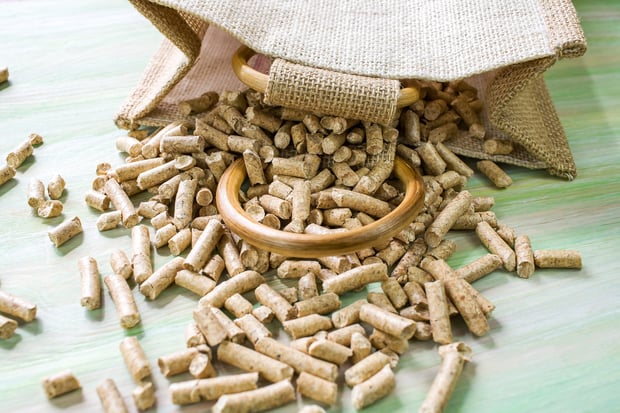
Chronic diarrhea, which is quite euphemistically called wet tail disease, is nothing like simply having a slightly uncomfortable wet tail. It is always life-threatening. If it is a disease causing the condition, it needs to be aggressively treated. However, even if it is simply an upset gut, water loss can quickly cause dehydration and be fatal for a hamster.
If your hamster only has softer than usual poop, and you know it is because it gorged on a banquet of fruit the day before, don’t give it any more treats for a few days. It should receive plenty of fresh water and regular pelleted hamster food. If there is no sign of improvement, medical attention is the next step.
Hamsters with wet-tail, i.e., chronic diarrhea, need urgent medical attention. They will not be able to recover on their own.
Frequently Asked Questions
What Can I Give My Hamster For Diarrhea?
Ensure that your hammie has plenty of fresh water and pelleted food available. Never withhold water. When a hamster develops diarrhea, the best option is to consult a veterinarian. Tests may be required to find the cause of the condition.
Wet-tail is extremely serious and can quickly kill your hamster. There is no home remedy or way to treat it on your own. If your hamster has chronic diarrhea, which is already manifesting as wet-tail, it will need veterinary treatment to recover.
In the case of mild diarrhea, before it develops into full-blown wet tail, liquid treatments like this one from Oasis are available that may provide relief. Hamster owners should consult with their veterinarians to ensure that they always have a hamster first aid kit on hand, including a first-line defense treatment for loose poop as soon as it is spotted.
Should I Be Worried If My Hamster Has Diarrhea?
Diarrhea is a life-threatening problem for hamsters. Effective treatment depends on the reason for the condition, and regardless of the cause, dehydration may result, which can also quickly be fatal.
Prompt action is required if you notice that your hamster has runny poop. A hamster’s condition can quickly deteriorate.
Can Hamsters Recover From Diarrhea?
If your hamster is in good health and has simply eaten too many treats like fruit, it may recover from mild water-poop diarrhea. However, it is not worth waiting to see, as even mild diarrhea can quickly lead to dehydration and death.
Check with a veterinarian immediately if you notice any significant change in the texture of your hamster’s poop. The outcome of the condition is often directly related to how quickly appropriate treatment is received.
The problem with diarrhea in hamsters is that, regardless of the cause, it can quickly lead to dehydration which can be fatal.
Conclusion
A hamster with diarrhea is a sick hamster, and it is always serious. Whether the cause is too much of a good thing or a gastrointestinal disease, the condition can quickly become life-threatening.
As soon as your hamster shows any signs of runny poop, it should be isolated from any cagemates, and a veterinarian needs to be consulted. When diarrhea becomes chronic, it is referred to as wet-tail, and treatment focuses on identifying the cause and keeping the animal hydrated.
Additional Reference:
https://www.ncbi.nlm.nih.gov/pmc/articles/PMC7152030
